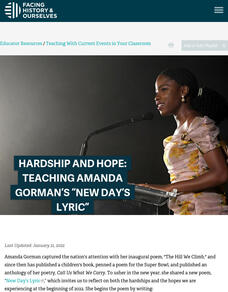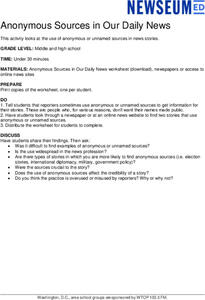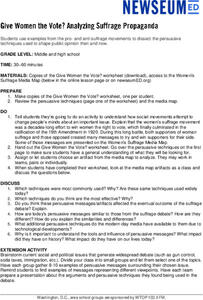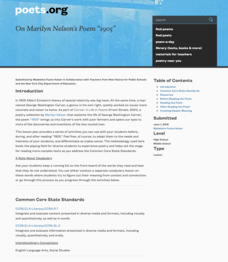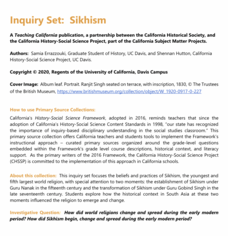Academy of American Poets
Teach This Poem: "Imagine" by Kamilah Aisha Moon
A lesson about Kamilah Aisha Moon's poem "Imagine" asks young scholars to imagine, "What would happen if...?" If Dr. Martin Luther King's dream became a reality. If Renisha McBride was a white girl and crashed her car in a black...
Academy of American Poets
Teach This Poem: "Old South Meeting House" by January Gill O'Neil
The vaulted ceiling of the Old South Meeting House has heard many voices. Young scholars read an excerpt about its importance in American history and then do a close reading January Gill O'Neil's poem, "Old South Meeting House." After...
PBS
Jackie Robinson's Complicated — and Important — Legacy
Americans tend to lock their heroes in history, holding these icons to a particular event or time. Jackie Robinson is such a hero, remembered by most for becoming the first African American to play in the Major Leagues. Young historians...
Facing History and Ourselves
Hardship and Hope: Teaching Amanda Gorman's "New Day's Lyric"
Class members come together to study Amanda Gorman's poem "New Day's Lyric." After a close reading of the poem, learners watch a video of Gorman reading her poem, and then craft additional lines for the poem where they offer suggestions...
Academy of American Poets
Teach This Poem: "On Being Brought from Africa to America" by Phillis Wheatley
Phillis Wheatley's poem, "On Being Brought from Africa to America" is the focus of a lesson plan that asks readers to consider how the poem is a critique of slavery. Groups comprise a list of words and phrases they notice as well as...
Academy of American Poets
The African American Experience
Disrespect can be as subtle as a frown or a turn of a head. To prepare for a study of Toi Derricote's poem "The Weakness" class members create wordless skits that demonstrate subtle or not so subtle signs of disrespect. After a...
K20 LEARN
The Emancipation Proclamation: Expanding The Goals Of The Civil War
Should Juneteenth be recognized as a national holiday? To prepare to take a stance on this question, young historians first analyze the Emancipation Proclamation and compare it to Lincoln's first Inaugural Address. Scholars then read an...
K20 LEARN
Slavery in the Constitution
Young historians may be surprised to learn that the Constitution of the United States includes provisions that protect the institution of slavery. Groups examine four clauses of the Constitution, as well as other primary sources, and...
Newseum
Bias Through History: Analyzing Historical Sources
Young journalists use the E.S.C.A.P.E. (evidence, source, context, audience, purpose, and execution) strategy to evaluate historical and contemporary examples of bias in the news. The class then uses the provided discussion questions to...
Newseum
The Press and the Presidency: Friend or Foe? How the President Is Portrayed
In theory, news reports should be fair and unbiased. Young journalists test this theory by selecting a current news story covered by various media outlets about the President of the United States. They then locate and analyze five...
Newseum
Anonymous Sources in Our Daily News
Young journalists search for two examples of news stories, either published or online, that use anonymous or unnamed sources. They then consider the possible motives for why the sources remain unidentified, the types of stories that use...
Newseum
Give Women the Vote? Analyzing Suffrage Propaganda
Propaganda is often used to shape public opinion. Scholars investigate the persuasive techniques used by the pro- and anti-suffrage movements. Groups compare how these devices were used during the suffrage movement with how the same...
American Institute of Physics
African American Inventors in History
A two-part lesson plan introduces young historians to the work of famous African American inventors. Groups first research and develop a presentation of an inventor that includes biographical information and information about one of...
Academy of American Poets
On Marilyn Nelson's Poem “1905”
Marilyn Nelson's poem, "1905," asks young scholars to compare and contrast George Washington Carver and Albert Einstein. After studying images of the two scientists and listing their observations, class members listen to several readings...
Franklin D. Roosevelt Presidential Library & Museum
Civic Holiday Work Sheets
Everyone loves a day off, be it a national or statutory holiday or a civic holiday. The final resource in a 10-part civics series features 14 worksheets of the type given to young visitors at the Franklin D. Roosevelt Library and Museum....
Franklin D. Roosevelt Presidential Library & Museum
Role Playing Relating to Big Decisions
While most high schoolers are too young to vote, they still need to learn the skills needed to solve problems. The ninth resource in a 10-part civics series presents class members with four "What Would You Do?" scenarios that have them...
Franklin D. Roosevelt Presidential Library & Museum
Voting and Participation in Decision Making
"If you don't vote - you don't count." That's the big idea in this resource about voting and participation in the democratic process. The three included activities focus students on being informed voters, practicing voting for their...
Franklin D. Roosevelt Presidential Library & Museum
What Does It Mean to be a Good Citizen?
Civics scholars are challenged to determine what it means to be a good citizen. Class members select three adults in their lives and interview them to discover what the term "good citizen" means to each of these people. The class then...
Franklin D. Roosevelt Presidential Library & Museum
Practice Passing Laws
Getting a bill through the legislative process to become a law in the United States is a very long and difficult procedure by design! To understand the deliberation, debate, and compromises involved, class members take on the role of...
Franklin D. Roosevelt Presidential Library & Museum
The Power of Propaganda in Shaping Civic Actions and Understanding
Propaganda posters are powerful. Using images from The Art of War: American Poster Art 1941-1945 exhibit, young historians analyze the symbols, images, colors, and text used to rally support for World War II. Through seven activities,...
British Council
Christmas
Pupils learn more vocabulary and English language by taking a close look at the words Happy Christmas and working in groups to see how many words they can make of the letters. Scholars then take a quiz to test their knowledge about...
University of California
Tenochtitlán
Behold, the Great Aztec empire! Scholars use primary sources to understand the impact of the Aztec city Tenochtitlan. Academics complete a worksheet and participate in group discussion to understand how Tenochtitlan was a melting pot for...
University of California
The Virgin of Guadalupe
A worldly resource focuses on the transfer of goods, ideas, and religion that took place as part of the Columbian exchange. Academics view sources such as text and artwork to help them complete a worksheet.
University of California
Sikhism
How does a new religion start? The informative resource highlights the Sikhism religion. Academics learn how the religion was created and spread throughout the ancient world. Scholars view a series of primary sources and complete a...





